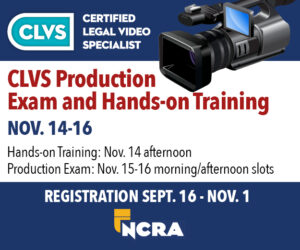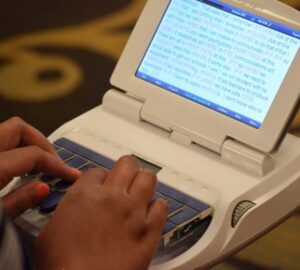Looking back 32 years ago when I started, the answer to what basic equipment was necessary for a new reporter was easy: Machine, paper, ink, dictaphone, an IBM electric typewriter equipped with what we called the court reporter ball, more paper, and carbon paper.
We have come a long way in that time period. Now the premise is all CAT, all realtime — or should be with brand-new reporters — and wireless technology. My list is going to be twofold: first the bare necessities, and second, what you need if you want to excel.
The bare necessities
- The court reporter model writer. A student writer just isn’t going to be able to do the job.
- The court reporter version of your CAT software. Again, the student version won’t cut the mustard, and most CAT companies won’t let you stay on it the first time you renew after school.
- A good notebook computer. Notice I didn’t say expensive. You can buy a fullsized, no frills, yet completely acceptable notebook for under $400.
- A good wheelie carrying case. Save your back from the start.
The above, except for the computer, can be purchased through your CAT vendor for a realistic monthly payment.
What you need to excel
- More dictation material! You need to pass the RPR, so get the dictation material you need, and get the prep pamphlets for the Written Knowledge Test. Because you can earn the RPR in legs, there is no excuse for not taking and passing it as you are ready.
- Get Wi-Fi for yourself on your jobs. You can tether your smartphone to your computer using tether.com, or you can often share your Wi-Fi connection with your phone if you have a data plan. I use a Mifi. It’s $50 a month, and I can share 10 connections if I wish. But you need Wi-Fi to quickly look up terms you’re not sure of on your breaks.
- Searchmaster. You can look up tons and tons of information with cool word searches and also search your past transcripts for names or terms. You can get it from Eclipse, Pengad, or gosearchmaster. com.
- A scopist. The number one problem most court reporters face when they get out of school is knowing how to put the page together. Unfortunately, the formatting can change from state to state, from jurisdiction to jurisdiction, and even from court to court. The better you understand how it’s supposed to look on the page, the easier it will be to write what you need to on the machine to make it look that way. Scopists are an invaluable tool in helping you see the page like it should be, and they can help you build your dictionary. Find a good one and you can develop a partnership that will last for years. Oh, yeah. Pay them right away. Even if it means tightening up on your grocery money. You can find scopists at Scopists.com, in your CAT specific forums, or through NCRA’s Online Sourcebook.
- Cabling for realtime. You need to learn how to hook up someone else to your computer, whether you’re ready for it or not. You want to know a secret? Nobody feels ready for it the first time. It’s like writing naked in a sandstorm. Raw, gritty, and very exposed. But we all had to do it, we all did it, and we all got past it. As with learning to write, practicing is important. By practicing, you keep getting better. No one wants to pay you for something that they could have understood better and made better notes in longhand.
- Copies of the notices for the job you’re taking. You can glean items for your job dictionary from there. For example, look for the city, state, and jurisdiction of the case. Get the case name in full, including first and last names of the parties, the attorneys, their law firms, and addresses. Look up the name of the deponent online; e.g., looking up physicians can get you a pretty good idea what kind of medicine they’ll be talking about. Preload your job file with briefs or names. Your depos will be half done before you start.
Dress for success
Guys, wear a suit. The most casual you should let yourself be is a sport coat, tie, and khakis. I know the attorneys are showing up sans tie. You aren’t an attorney. This is your workplace, and you need to dress appropriately. Don’t overdo it, though. What your wife or girlfriend might love to see on a formal date shouldn’t be worn in a deposition suite. You might get a reputation as a dandy. Yes, I know that’s a dated word. It still applies. Look it up.
Ladies, the courtroom is not a place for cleavage. Wear nice suits or pantsuits. The skirts need to be at the knee, not above the rear. You need to have a professional look. I’ve seen what some think passes for a professional look. It does — just not our profession.
CRR, RMR, RSA, LMNOP
After you get your RPR, don’t stop. Test-taking is habit-forming. Not taking tests is an evil addiction. It means you’re stalled and stagnant. So keep up the practice. You never stop learning.
You need to be well-rounded. Read the news daily on an Internet site of your choosing. Television is all well and good, but you’re not going to get the spellings out of the air. I guarantee they will talk about what’s currently in the news in your depositions, even in discussions that are not on the record. If you want to be seen as competent, don’t give the glassy-eyed answer to a question on current events.
To be confident, you have to give the appearance of being competent. Despite all the technology we use, this profession of ours is people-driven. If your clients don’t see you, if they don’t get to know you, if they don’t trust you, your tenure will be short-lived.
Remember, practice, practice, take tests, and become one of the members of the top echelon of court reporters so that you can compete with the big dogs and win.





















